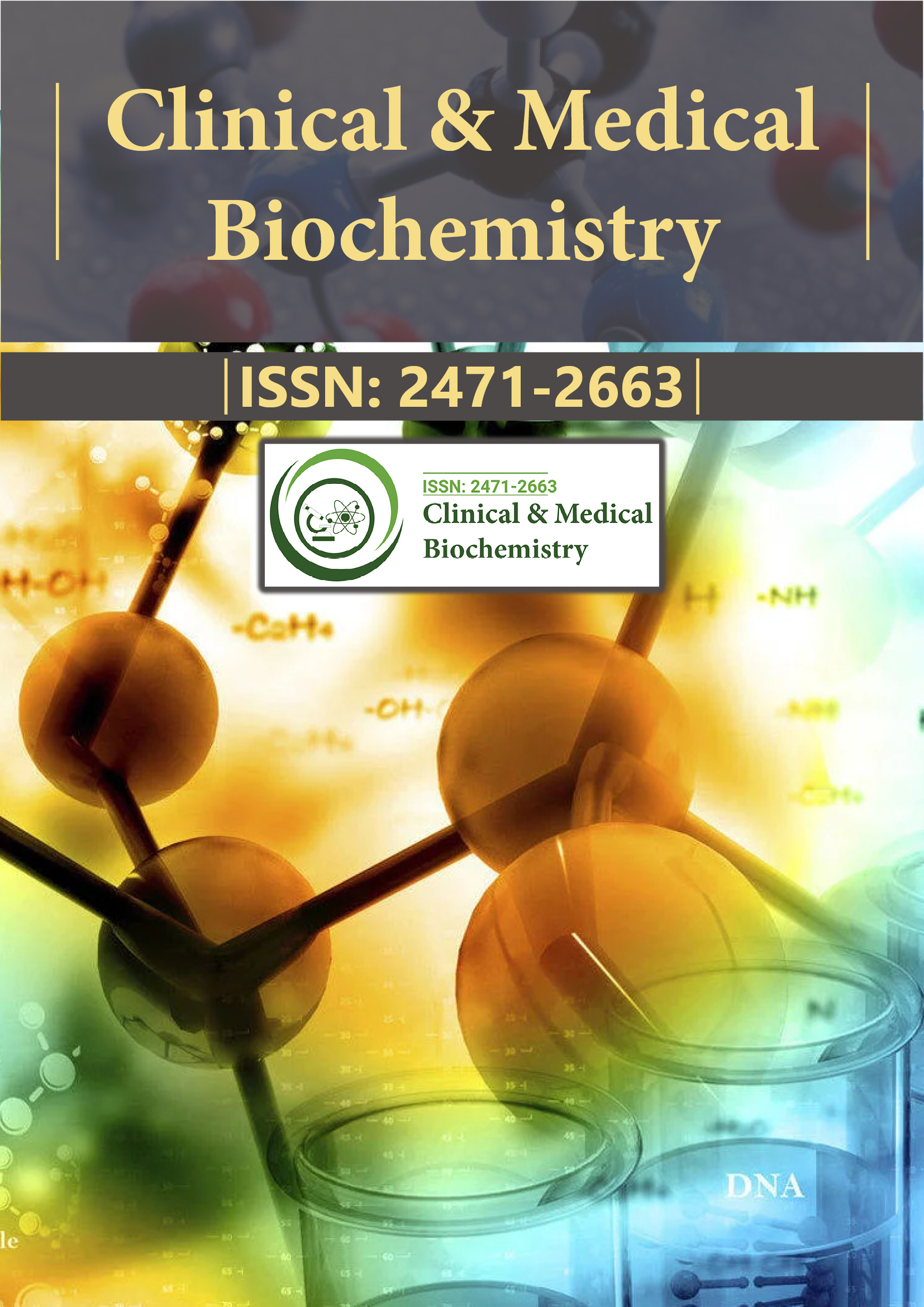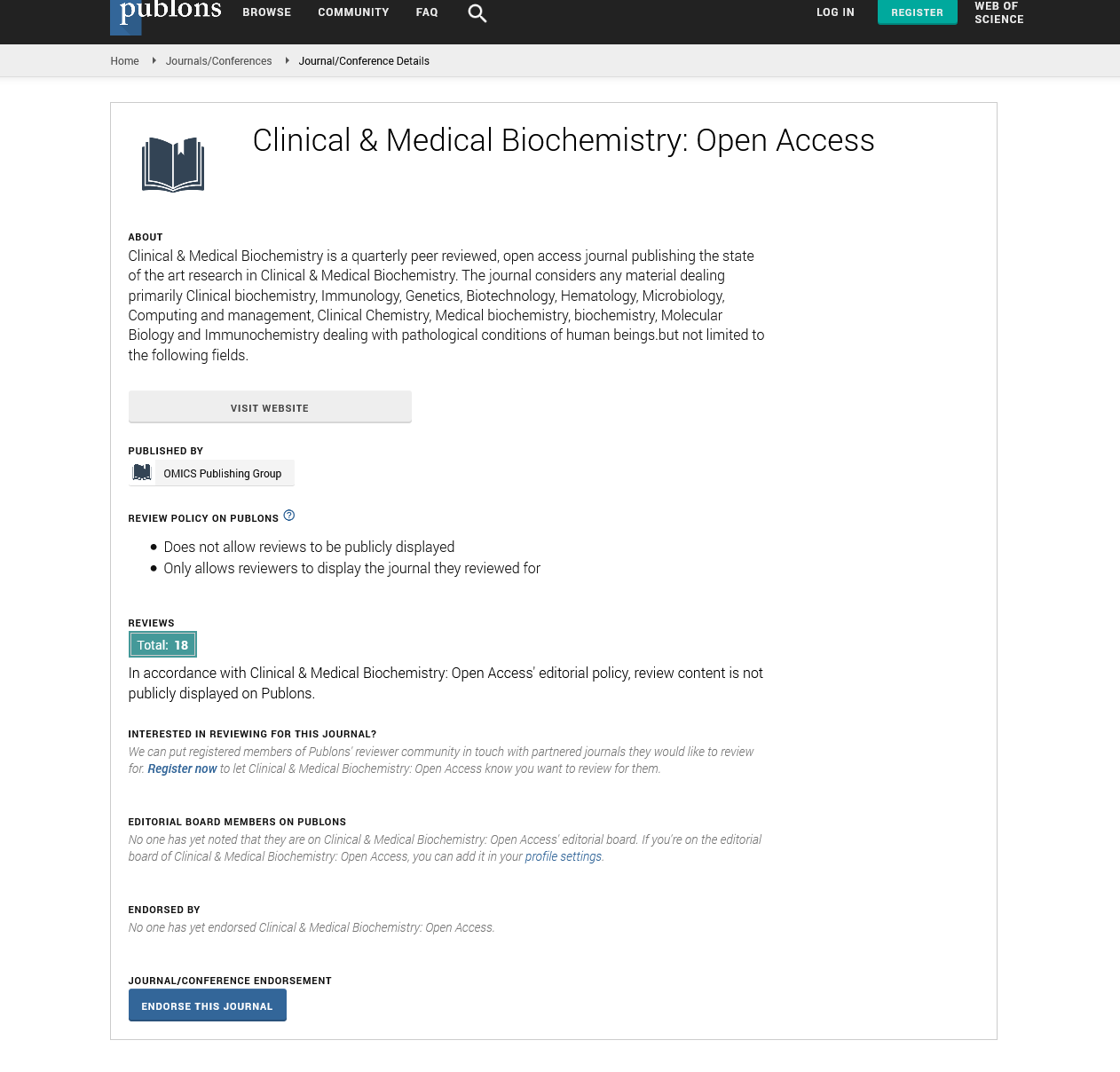Indexed In
- RefSeek
- Directory of Research Journal Indexing (DRJI)
- Hamdard University
- EBSCO A-Z
- OCLC- WorldCat
- Scholarsteer
- Publons
- Euro Pub
- Google Scholar
Useful Links
Share This Page
Journal Flyer

Open Access Journals
- Agri and Aquaculture
- Biochemistry
- Bioinformatics & Systems Biology
- Business & Management
- Chemistry
- Clinical Sciences
- Engineering
- Food & Nutrition
- General Science
- Genetics & Molecular Biology
- Immunology & Microbiology
- Medical Sciences
- Neuroscience & Psychology
- Nursing & Health Care
- Pharmaceutical Sciences
Editorial Note - (2020) Volume 6, Issue 3
Biotechnology: Healing, feeding and fuelling the world
Tomris Ozben*Received: 04-Nov-2020 Published: 27-Nov-2020, DOI: 10.35248/2157-7064.20.6.e102
Editorial
Clinical Biochemistry is the area of chemistry that is generally concerned with analysis of bodily fluids for diagnostic and therapeutic purposes. It is an applied form of biochemistry which is not to be confused with medicinal chemistry, which involves basic research for drug development and the chemical characteristics and reactions of a particular living organism or biological substance, a change in the patient's biochemistry accompanied her psychological depression. These vast topics combined together of larger scope of research in the clinical and medical biochemistry journal. The journal was started on 2015 with the half yearly basis and with 25+ million reader base.
Biotechnology is used in almost all the important aspects in our current day to day life. The application of biotechnology is major in agriculture sector, health care/medical research, transgenic animals and environment/industrial uses. Biotechnology is technology that utilizes biological systems, living organisms or parts of living organisms to develop or create different products and new technologies. Biotechnology controls and makes uses of processes that involve cells and their structures (cellular and bio-molecular) to develop technologies and products as well, which helps improve the health of humans and the life of our planet earth.
The medical use of biotechnology is helping in decreasing rates of infectious disease; Saving millions of lives across the globe; Changing the odds of serious, life-threatening conditions affecting millions all around the world; Tailoring treatments and making individuals adapt to new health technologies to minimize health risks and side effects; Creating more precise tools for detecting diseases; and Combating serious illnesses and everyday threats confronting the developing world.
The agricultural use of biotechnology is helping to feed the world by generating higher crop yields with very few or zero inputs; Reducing the volume of agricultural chemicals required by crops which in return is helping environment by limiting it from exposure to chemical products; Using biotech crops that need fewer applications of pesticides and that allow farmers to reduce tilling farmland; Developing crops with enhanced and enriched nutrition profiles that solve vitamin and other deficiencies; Producing food free of toxins like mycotoxin; and Improvising crop oil content to help improve cardiovascular health.
The industrial use of biotechnology is helping fuel the world by designing and streamlining the steps in chemical manufacturing processes; Decreasing or lowering the temperature for cleaning clothes and saving many billions annually; Improving the efficiency of manufacturing process to save the operating costs; lowering or reducing the use of petrochemicals; Using biofuels to eliminate greenhouse gas emissions; Reducing water usage which helps in decreasing waste generation; and Striking against the full potential of traditional biomass waste products.
Modern biotechnology has produced breakthrough products and innovative technologies to combat rare diseases, reduce our environmental risks, feed the hungry, use less energy, and have safer, cleaner and more efficient industrial manufacturing processes. At present, there are more than 250 biotechnology health care products and vaccines available to patients, for the diseases that were previously untreated. Many millions of farmers around the world use agricultural biotechnology to increase yields, prevent crop damage from insects and pests and reduce farming's impact on the environment. And more than 50 bio refineries are being built across North America to test and refine technologies to produce biofuels and chemicals from renewable biomass, which will definitely help in reducing greenhouse gas emissions. Recent advances in biotechnology are helping us prepare for and meet society’s most pressing challenges.
Citation: Ozben T (2020) Biotechnology: Healing, feeding and fuelling the world. Clin Med Biochem. 6:e102. DOI: 10.35248/2157-7064.20.6.e102.
Copyright: © 2020 Tomris Ozben. This is an open-access article distributed under the terms of the Creative Commons Attribution License, which permits unrestricted use, distribution, and reproduction in any medium, provided the original author and source are credited.

